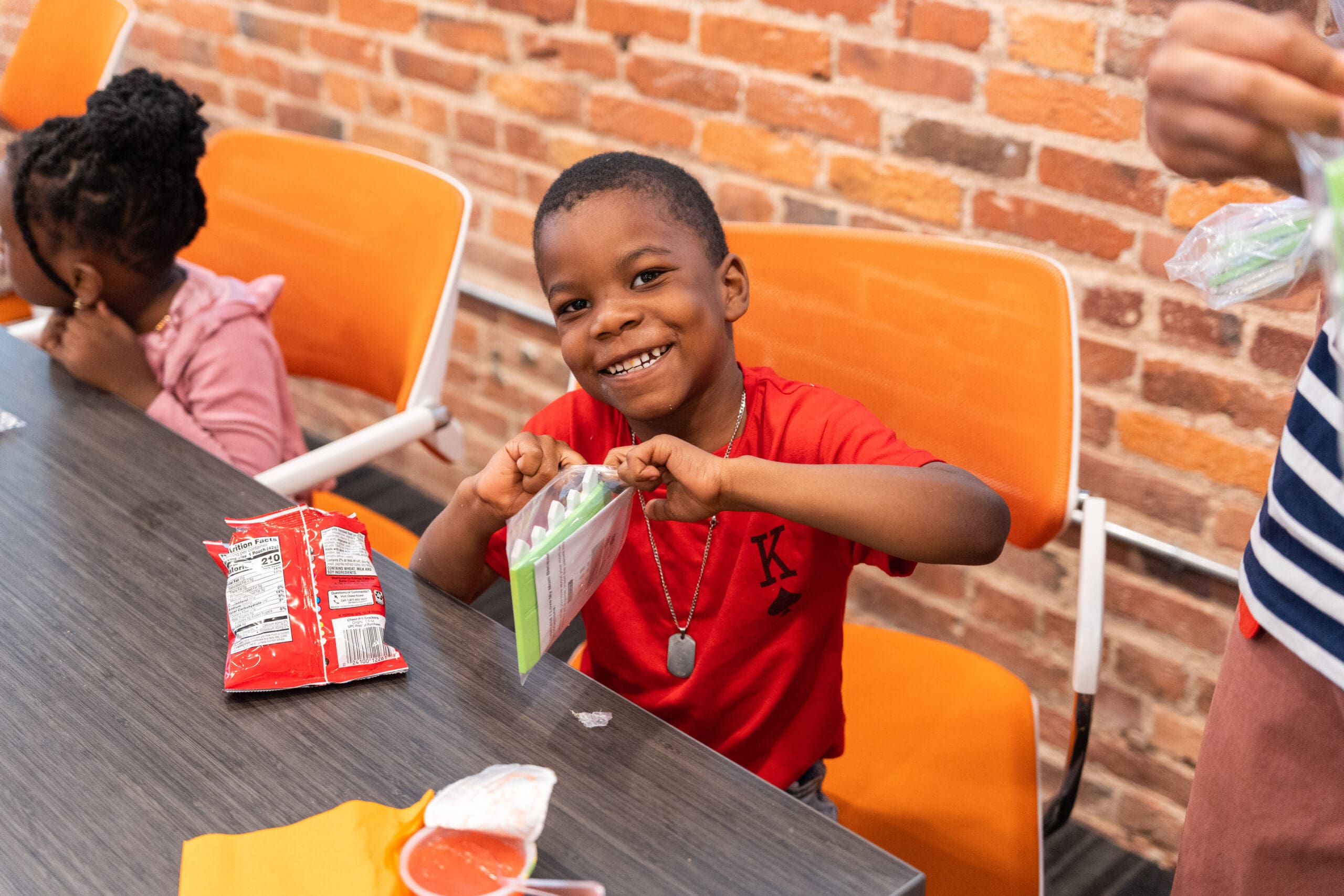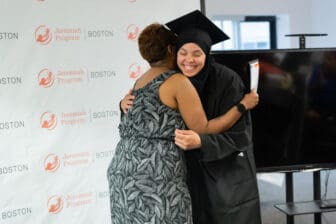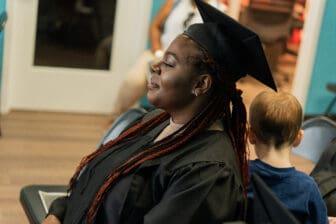A Model for Tomorrow
JP campuses that operate without attached housing are forging the future of 2Gen work through local partnerships and creative programming.
Jeremiah Program is built on the belief that access to five key pillars can disrupt poverty two generations at a time: career-track college access, quality early childhood education, empowerment and leadership training, supportive community, and safe and affordable housing.
But not every JP campus relies on the same model to provide these core pillars.
The Baltimore, Brooklyn, Boston, and Las Vegas campuses, for example, are informally referred to as “non-residential” campuses. Housing is secured through community partnerships rather than provided in a JP-owned apartment building. But the term “non-residential” falls short by implying something is missing.
“Our non-residential campus model isn’t just a variation of regular housing. It’s a dynamic approach with potential to reshape housing practices and foster positive outcomes,” says Bonita Broadnax, JP’s director of housing and operations. “The non-residential campuses are exciting because they lack attached housing. It’s an avenue to explore public-private partnerships, creating a model for others to follow.”
A Promising and Evolving Model
As Bonita and the leadership of all four non-residential campuses point out, the “community hub” model offers several key advantages.
Moms with children up to 10 years old are eligible, while the upper age in residential settings is 5.
Women who already have stable housing can get a jump start on pursuing their education.
Women still seeking housing can access a city-wide network of options and support as they transition into safe, affordable homes.
Because moms live in different neighborhoods, they act as unofficial ambassadors to the program in pockets of the community that may not know about JP.
And, as Las Vegas Executive Director Maria Tucker, Ph.D., put it, “The gift is in being laser-focused on higher education. We don’t have moms coming to us simply to get housing. It becomes really about college and going to college.”
“Now is the time to explore approaches and service delivery models that maintain our core mission while evolving to meet the changing needs of non-residential moms.”
Alison Carter Marlow, JP Boston Executive Director
These advantages aren’t just anecdotal. Expanding non-residential services became a strategic priority after a 2018 study of the Boston campus — conducted by partner institution Endicott College and funded by the Annie E. Casey Foundation — found the model to be viable, scalable, and flexible.
As Alison Carter Marlow, executive director of JP Boston said, “Now is the time to explore … approaches and service delivery models that maintain our core mission while evolving to meet the changing needs of non-residential moms.”
“Our non-residential model is about identifying specific needs and partnering with those [organizations] excelling in those areas,” said Senior VP of Family Programming Payal Seth. “It’s not just standing up a program; it’s about recognizing gaps and offering relevant programming.”
Brooklyn and Boston were JP’s first two non-residential campuses, Boston opening in 2016 and Brooklyn following in 2017. As part of a five-year goal to increase the number of moms JP serves by 170%, Baltimore and Las Vegas opened their doors in 2022.
As a newer ED, Maria found that, even though local needs are major variables in her programming, she benefits from being able to reference an existing blueprint and the experience of her non-residential colleagues.
“The collaborative relationships we have as educators across campuses, along with the infrastructure that JP has put in place, make us a more stable startup here locally,” she said. “It helps us be taken seriously on the ground.”
For example, Alison can advise her colleagues on creative ways to collaborate with local higher ed institutions.
“Our approach is about forging bonds with colleges, ensuring they understand the value of our moms,” Alison said. “We’re flipping recruitment, advocating for our moms already in college, and seeking partners in rewriting the narrative.”
Bonita sees this nimble approach as the future of 2Gen work.
“With our non-residential model, we’re shaping a national impact — changing systems, working with public entities, and ensuring the success of single moms in housing,” she said. “With public-private partnerships, we have the chance to influence broader thinking about housing. Our approach could reshape how organizations provide for single mothers in need.”
Unique Challenges Call for Unique Solutions
By serving as community centers and hubs for resource coordination, the Baltimore, Brooklyn, Boston, and Las Vegas campuses create multiple avenues for growth and opportunity specific to the needs of the women they serve. While most single moms experiencing poverty face many of the same challenges, some are exacerbated by location.
For example, Las Vegas is a popular city for those seeking work in the hospitality industry. As a result, many families are transplants and may not have an established local support network.
Boston’s institutions are notoriously difficult to navigate, and families often encounter underfunded neighborhoods and struggling schools, among other disparities.
Baltimore has limited and unreliable public transportation options, and Brooklyn has a massive shortage of affordable child care that’s open and available when single moms need it.
In all cases, moms may love their city but find the puzzle of researching and accessing necessary resources incompatible with single parenting.
Fun (and Learning) in the
Summer Sun
Summer can be a tricky time for single moms looking for safe and affordable opportunities for their kids. JP’s non-residential campuses don’t operate Child Development Centers, but we step up big time when it comes to making sure kids have a blast (safely) while school is out.
As part of our summer enrichment programming, JP invests $1,250 in each child in each of our nine locations, paying for camps, classes, and other activities.
Some sign up for crafts and swimming at the YMCA. Others opt for hip-hop dance, martial arts, or robotics classes. And still others pursue tutoring to combat learning loss due to the COVID-19 pandemic. A few of the older kids even get behind the wheel for driver’s ed. Each family makes the decision that’s best for them, and JP is there to make it possible.
“Summer enrichment shouldn’t be a privilege,” said Payal Seth, JP’s Senior VP of family programming. “We’re democratizing access to quality programs, opening doors to experiences that were previously reserved for the fortunate few.”
Non-residential campuses can break the code.
“Our aim is to guide and champion moms through complex systems,” Payal says. “It’s about reinforcing their safety nets, making sure they’re not alone in navigating challenges.”
In addition to supporting moms in accessing resources, JP staff working on and with non-residential campuses are also becoming experts in how to help moms find and maintain successful landlord-tenant relationships.
“The creative aspect … is exciting,” said Bonita, who has been working on a new curriculum for single moms navigating the housing market. “We’re partnering with mom-and-pop landlords, offering master leases for security, and fostering beneficial collaborations.”
A Place to Come Together
Non-residential campuses may not operate apartment buildings, but they do have physical locations. These spaces serve as gathering spots for coaching, studying, Empowerment and Leadership sessions, and child care. For coming together to forge connections as a community.
“I really would love our physical office to be a community hub,” says Danielle Staton, JP Baltimore executive director, a newer campus that is growing into its space and identity. “I want it to be a space where not just JP moms feel like they could be a part, but other moms in the Baltimore community, other single moms, other adjacent organizations.”
Chantel Berkley, a JP grad from Baltimore, found the campus to be not only welcoming but also a radical improvement to her life.
“I love that the whole program is about community and togetherness,” she said. “They schedule events for us to get to know each other, to celebrate each other, to encourage and support each other, and also for the children to engage with one another. That is such a good component of the program.”
Because moms do not live in the same location, fostering the famous JP sisterhood means going beyond occasional social hours. Building community is an intense and intentional aspect of the work. Sometimes the gatherings are in person, and sometimes they are virtual, but they are all structured to add value to moms’ lives by teaching them new skills, creating space for laughter, and making sure no one feels they must walk their path alone.
“We’re cultivating connections that go beyond location,” said Payal. “Non-residential campuses embrace the essence of community.”
Did this story resonate with you? It was featured in the first issue of Imagine, JP’s magazine, in 2023. Our 2025 issue is in production — you don’t want to miss it!



